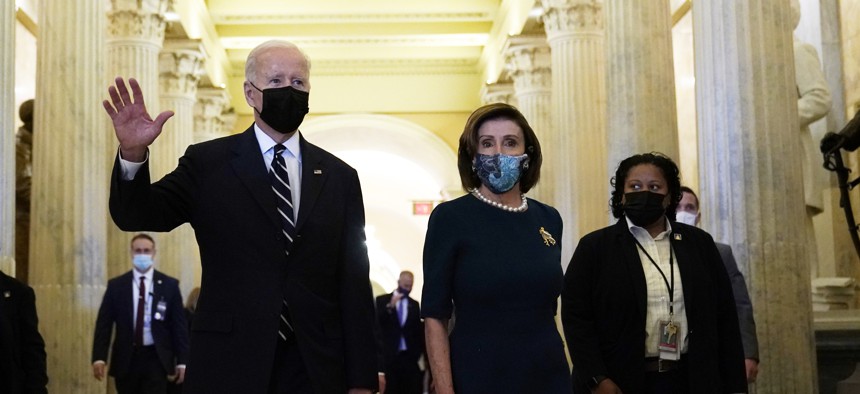Biden Releases $1.75T Social Spending Framework to Win Over Democrats

President Biden walks with House Speaker Nancy Pelosi on Capitol Hill in Washington, Thursday, Oct. 28, 2021, following a visit to meet with House Democrats. AP Photo/Susan Walsh
The White House scaled back the original $3.5 trillion proposal, dropping paid family and medical leave and some Medicare expansions.
President Biden and Democratic leaders hoped to unite a divided party Thursday around two parts of their economic agenda—a social spending package and infrastructure bill—with the release of a draft bill outlining the $1.75 trillion proposal.
The scaled back domestic spending package is about half the cost of Democrats’ original budget reconciliation framework and includes significant investments in climate initiatives, health care programs and education.
House Democrats released a 1,864-page draft bill Thursday afternoon, hoping it would provide enough forward momentum to rally support for a separate infrastructure package that could see a vote as soon as Thursday evening. Biden courted Democrats on Capitol Hill, meeting privately with members in a bid to win their support despite the cuts to the package.
His proposal includes funding for universal pre-kindergarten for all 3- and 4-year-olds, cover child tax credits for one year, expand Medicare to cover hearing aids, combat climate change, and create more affordable housing. But it leaves out funding for other initiatives like paid family and medical leave, a priority House Speaker Nancy Pelosi said she was committed to addressing at a later time.
“No one got everything they wanted, including me,” Biden said at the White House after he returned from Capitol Hill, where he pleaded with Democrats to put aside differences. “But that’s what compromise is. That’s consensus."
Disagreements among Democrats over the cost of the entire spending plan have for months threatened to derail the package and jeopardized the future of a separate $1 trillion infrastructure bill. Thursday’s announcement came just before Biden was set to head to Europe.
Moderate holdouts Sens. Joe Manchin and Kyrsten Sinema declined to say outright Thursday whether they would back the proposal. The Congressional Progressive Caucus said despite supporting Biden’s framework agreement, dozens of members will not vote for the separate infrastructure bill unless it is linked to the spending package.
“There is too much at stake for working families and our communities to settle for something that can be later misunderstood, amended, or abandoned altogether,” the caucus said in a statement issued Thursday evening.
The White House said “President Biden is confident this is a framework that can pass both houses of Congress.”
During his address, Biden touted the spending package as “an historic economic framework” and praised included initiatives he said would drastically help average Americans.
In particular, Biden singled out the plan to provide $150 billion for Medicaid coverage for home care services for seniors and people with disabilities. The funding will help the more than 820,000 people on state Medicaid waiting lists get assistance so they can remain in their homes.
“Millions of you are in the sandwich generation who feel financially squeezed by raising a child and caring for an aging parent,” Biden said. “We are going to expand services for seniors so families can get help from well-trained, well-paid professionals to help them take care of their parents at home—to cook meals for them, to get their groceries for them.”
- $400 billion to cover the expansion of pre-kindergarten education for six years.
- $200 billion for the one-year expansion of child tax credits and expansion of the earned income tax credit to 17 million childless workers.
- $555 billion for climate-related provisions.
- $150 billion for affordable housing.
The plan would expand Medicare, the government’s flagship health insurance program that covers more than 60 million seniors and disabled people, with $35 billion in investments to include hearing care. It leaves out an expansion of dental and vision care that was included in the original $3.5 trillion plan. Also cut from the proposal is paid family and medical leave.
Vice President Kamala Harris met with a bipartisan group of mayors Thursday afternoon to discuss the spending framework, calling it a “transformative” opportunity for the country.
The White House said the spending package is paid for through a series of new taxes on corporations and the wealthiest Americans—stressing its long-held position that no one making less than $400,000 will see a tax increase.
The proposal calls for a 15% corporate minimum tax on large companies and a 1% surcharge on corporate stock buybacks. It also estimates that increased IRS enforcement measures will generate $400 billion in new funding.
The framework earned praise from local government groups and housing advocates.
“The pandemic has highlighted and exacerbated shortcomings in our social safety net,” said Debbie Cox Bultan, CEO of the NewDEAL, in a statement. “State and local leaders fighting for more equitable access to critical needs will be especially grateful for an infusion of federal support for affordable health care, early education, and economic opportunity for all Americans.”
The housing investments included in the package, which would increase funding for the Housing Choice Voucher program and the Housing Trust Fund, are long overdue, said Nan Roman, president and CEO of the National Alliance to End Homelessness.
“These investments could not have come at a more critical time,” Roman said. “These funds could end homelessness for tens of thousands of people and prevent thousands more from becoming homeless.”
Andrea Noble is a staff correspondent with Route Fifty.
NEXT STORY: Where Unemployment Rates Are Bouncing Back the Most and Least





